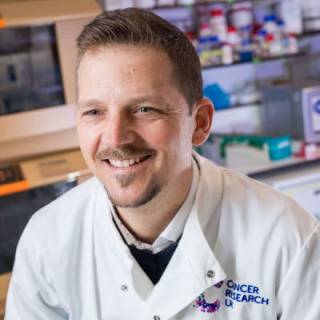Constant cell cycling enables cancer cells to proliferate but also creates stresses that could be their Achilles heel, suggests Professor Rob de Bruin.
Continuing rounds of cell division is the hallmark of cancer. However, the cell cycle is an exquisitely finely regulated process, and endless cycles of cell division present fundamental challenges to cancer cells. A deeper understanding of how they overcome these challenges could reveal vulnerabilities able to be targeted therapeutically.
Professor de Bruin and colleagues are focusing on the G1-S transition, the point at which cells commit to a new cell cycle and begin replicating their DNA. The G1-S transition is characterised by a specific programme of gene expression which, when activated, drives a cell into the cell cycle and is gradually wound down as cells progress through S phase. This programme is deregulated in virtually all cancers - persistent activation of the G1-S programme means that daughter cells commit to a new division cycle as soon as a parent cell finishes dividing.
Working initially in yeast, Professor de Bruin has identified that the key mechanisms controlling the G1-S transcription programme are conserved from yeast to humans [1]. Notably, control of the programme, regulated by the E2F family of proteins in human cells, is tied to a checkpoint system that detects signs of 'replication stress' - slowing or stalling of DNA replication forks. When replication stress is detected, a pause button is pressed and DNA replication is temporarily halted until the problem is resolved - a response that prevents DNA damage linked to faulty DNA replication.
Notably, Professor de Bruin and colleagues have shown that maintaining E2F-dependent transcription in response to the detection of replication stress plays an essential role in the prevention of replication stress-induced DNA damage [2, 3].
In terms of cancer, constant cycling generates high levels of replication stress - known as oncogene-induced replication stress. A key question in cancer cell biology is whether there are any distinctive features of cancer-related replication stress, which could offer new targets for intervention. More generally, it is unclear why cancer cells seem able to survive in the face of such high levels of replication stress.
Professor de Bruin's recent work suggests that E2F-dependent transcription holds the answer to both these questions. Paradoxically, while oncogene-driven deregulated E2F-dependent transcription generates replication stress, by driving cells prematurely into S phase, E2F-dependent transcription also provides the mechanism by which cancer cells can tolerate high levels of replication stress.
Professor de Bruin is now dissecting the E2F-dependent transcription programme to identify the E2F targets that are critical to a cell's enhanced tolerance of replication stress. These could be key therapeutic targets, as lowering the tolerance to replication stress would activate mechanisms for disposal of faulty cells. Importantly, interventions targeting replication stress should act predominantly on cancer cells, as normal cells are generally not affected by replication stress. Furthermore, G1-S deregulation is not only common to all cancers, but also represents a very early step in the development of cancer - suggesting that interventions might even have a chemopreventive role.
- Bertoli C, Skotheim JM, de Bruin RA. Control of cell cycle transcription during G1 and S phases. Nat Rev Mol Cell Biol. 2013;14(8):518-28.
- Bertoli C et al. Chk1 inhibits E2F6 repressor function in response to replication stress to maintain cell-cycle transcription. Curr Biol. 2013;23(17):1629-37.
- Bertoli C et al. Sustained E2F-dependent transcription is a key mechanism to prevent replication-stress-induced DNA damage. Cell Rep. 2016;15(7):1412-1422.
 Close
Close


